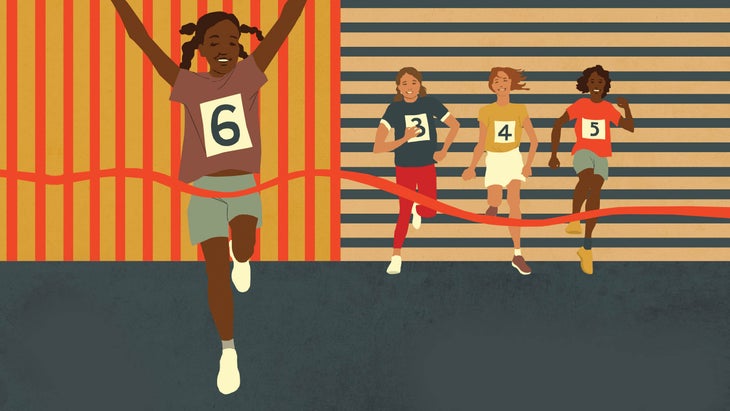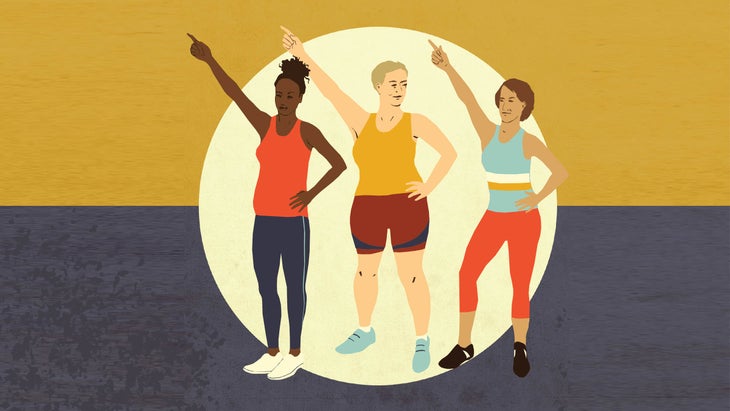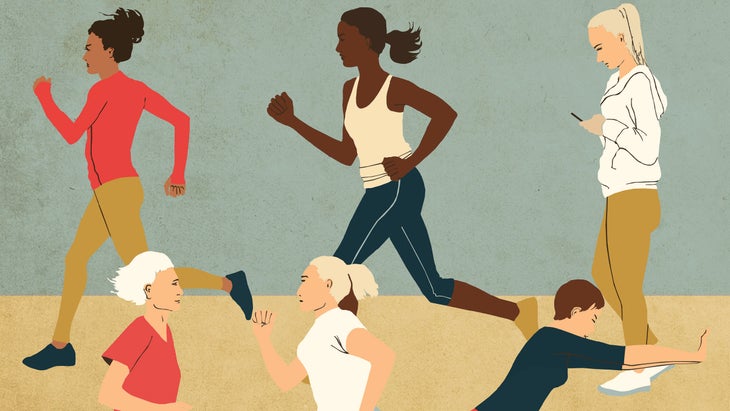Products You May Like
Get access to everything we publish when you
sign up for Outside+.
Experts, athletes, coaches, and parents agree that raising young female athletes requires careful navigation through many challenges, especially during and after puberty. We’re only starting to understand what it takes to help them flourish. Partly, perhaps, because we’re only starting to understand what it takes to help ourselves truly flourish.
In this five-part investigative report, we examine both how to #FixGirlsSports and raise a stronger, healthier next generation; as well as how to re-evaluate our own body image for the better, including the resources you need to rebuild or fortify one of the most important relationships of all—the one with yourself.
When you walk up to a mirror, who do you see looking back at you? The way you perceive your body—and how you feel about yourself as a result—constitutes your body image.
Early experiences form the bedrock of your self-perception. However, your body image continues to evolve over time, and even shifts in different contexts, says Riley Nickols, a sport psychologist and eating-disorders specialist at Mind-Body Endurance in St. Louis. For instance, you might feel self-conscious in your running group but more confident out at dinner with co-workers.
In fact, it might be helpful to think of body image as more of a relationship with your body, says Savannah Fernandez, sport psychologist at the Victory Program for Athletes at the McCallum Place Eating Disorder Centers in St. Louis.
“When we think about the other relationships in our lives—friends, family, romantic partners—we have a general sense of how we feel about them and how we relate to them,” she says. “But it looks different day to day, week to week, and depending on the season of life you’re in.”
The upside to this malleability is that even if you’re not in a positive place now, you’re not doomed to feel awful forever, says Marci Evans, a Cambridge, Massachusetts–based dietitian. In fact, she’s so certain change is possible she calls herself a body image healer, just as dedicated to revamping client’s self-perceptions as she is to advising on their eating habits.
Dozens of variables influence how people feel about their bodies, she says. Here are 10.
10 Factors that Affect Body Image
Some of these variables you can change, while others remain outside your control; still, recognizing them proves powerful.
Factor 1: Your Upbringing
Developmentally, kids start forming ideas about their bodies around ages 7 to 9, Evans says. “When I’m working with my clients, sometimes we will think back to specific memories that they might have about having a body around second, third, or fourth grade,” she says.
Parents play a large role in kids’ emerging realities. Some of this influence is direct—for instance, commenting frequently on their children’s body size or eating habits. But often, it’s indirect, by the behaviors they model, Fernandez says. If you remember that a parent or caregiver was always on an extreme diet or disparaging their own shape or size, that will likely spill over into your own body image, as well.
Factor 2: Coaches

For athletes, coaches also wield an enormous amount of authority, Fernandez says—and when it’s not used wisely, that can be damaging. “We sometimes see coaches still emphasizing that you need to be [one specific] weight, or else you’re not going to be successful,” she says; in reality, body composition is only one of many variables that may play a role in how an athlete performs. But when coaches stress it, hard-working runners may then shift their efforts toward reducing the number on the scale, often to the detriment of their health and performance.
On the flip side, coaches who speak openly and directly about body image and fueling (and keep an eye out for athletes who are struggling with disordered eating and eating disorders) may foster a more positive relationship between athletes and their bodies. “Coaches can create a culture that can either be really helpful and supportive or, unfortunately, perpetuate some of those challenges that are already out there,” Fernandez says.
Factor 3: Peers
Besides these authority figures, the other people in your orbit matter to your mindset. That includes your friends, co-workers, running buddies, romantic partners, and everyone else around you. It’s human nature to compare, so if everyone in your social circles is the same size and shape, you’re going to feel differently about your body than if you surround yourself with diversity. Plus, the way these people talk about your body, and their own, influences your thoughts and interpretations.
Factor 4: Media
Magazines and TV often portray unrealistic body types or promote “diet culture”—messages that equate weight loss and lean bodies with health and moral virtue. This includes the idea that you’re “doing something right” if you’re trying to lose weight, says Rebecca McConville, a registered dietitian and author of Finding Your Sweet Spot: How to Avoid RED-S (Relative Energy Deficit in Sport) by Optimizing Your Energy Balance.
And social networks are double-edged swords, Leeja Carter, a feminist sports psychologist, says. Well-curated feeds offer connection and motivation, but many “fitspiration” memes echo worn-out tropes equating being thin to being beautiful and worthy. York University research found women tend to feel worse after viewing attractive peers on social media or commenting on their posts.
Factor 5: Background
In addition to society writ large, scripts specific to your racial, geographic, or other context also run through your mind, and these can be a hidden factor that affects body image. For instance, Black women may internalize the idea that curvier bodies are more beautiful, Carter says—sometimes creating cognitive dissonance for runners of color.
Factor 6: Biology

Genetics influences not only the size and shape of your body, but also how you feel about it, according to a study in Psychological Medicine. Hormones, too, play a role; German researchers found women felt more attractive—and spent less time staring at parts of their bodies they deemed unattractive—around the time they were ovulating. Physiological events, such as pregnancy or illness, also may alter your self-perception, says Margaret Ottley, a sport psychology professor at West Chester University.
Factor 7: Eating Disorders
Many eating disorders are characterized by a distorted body image, a mismatch between what’s visible in the mirror and the way athletes perceive and see their own bodies, McConville says. These conditions aren’t a choice an individual makes, but rather, ways your brain attempts to regain control and protect you from danger.
Working with a team of qualified clinicians, including a dietitian and psychologist or therapist, can help you drill down to the underlying cause and regain your health. Reach out to a health care provider directly, or call the National Eating Disorder Association Helpline at 1-800-931-2237. If you’re in crisis, you can text “NEDA” to 741741 to be connected with a trained volunteer at Crisis Text Line.
RELATED: What Eating Disorder Recovery for Runners Looks Like Now
Factor 8: Injury Status
Many runners and other athletes feel good about their bodies only when they’re training hard and hitting all their goals, Fernandez says. So when injury strikes and interferes with their ability to pursue their ambitions, their mood and self-worth can tank.
Factor 9: Evolution
Neuroscientists have located nine brain regions involved in processing body image, Evans says. Interestingly, many of them, including the amygdala, regulate fear and other deeply rooted responses. That may be because we’re wired to want to fit in; in the past, the more we look like those around us, the more likely we are to be accepted and protected against threats to our survival.
Factor 10: You

Your response to these internal and external forces can amplify or minimize their impact, Carter says. If you’re rigid and punishing—for instance, withholding food when you miss a run or not building rest and recovery into your schedule—you’re likely to feel worse. On the other hand, if you can tune out the noise and give your body the fuel and movement it needs, your body confidence may rise as a result.
The impact of each of these factors is personalized, Fernandez says. Even children whose parents raised them in a supportive, body-accepting atmosphere could struggle with body image because of external or biological factors. And two people can look at the same social media post and absorb different messages—one can be a “neutral consumer,” taking away a new strength-training move or running workout, while the other internalizes the ways in which her body isn’t as toned, fit, and perfect as the poster’s.
“There is no really perfect science to it,” Fernandez says. But getting to the bottom of what influences your individual, unique body image can help you counteract negative influences and regain control of your own narrative.
The idea isn’t to go from struggling with body image to loving your body all the time—that’s unrealistic, and frankly, impossible, Fernandez says. Rather, the goal is to create a space between the negative feelings about your body that arise and the impact they have on your mental health and well-being.
To do so, she recommends athletes learn to practice self-compassion. While this quality doesn’t always come easily for driven competitors, it can go hand in hand with performing your best. “It’s not abandoning being a hard worker and abandoning high-achieving goals,” she says. “It’s just learning how we can better relate to ourselves through the trials and tribulations of pursuing that excellence.” (One resource she suggests: The Mindful Self-Compassion Workbook: A Proven Way to Accept Yourself, Build Inner Strength, and Thrive, by Kristin Neff.)
“If we’re going to say, ‘Well, I’m never going to feel upset about my body image,’ you’re setting yourself up for failure,” she says. Instead, ask how you can remove some of the influences that perpetuate negative feelings, and aim not to beat yourself up when they do arise. “How am I going to hold myself kindly and compassionately in those days where it’s really, really hard? That’s where the true work is,” she says.
Read On:
This is How You Raise Healthy Female Athletes
How Coaches and Parents Can Keep Girls Running
What is Healthy Body Image, Anyways?
9 Simple Tools for a Stronger Body Image
